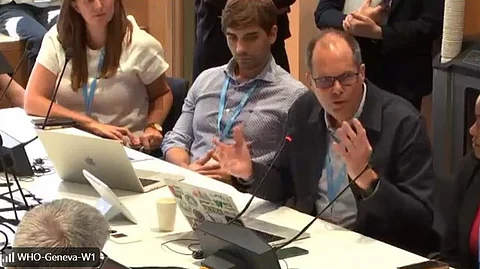

The Wildlife Conservation Society is in Geneva, urging the World Health Organization to finalize the International Agreement on Pandemic Prevention, Preparedness and Response.
An agreement may be reached on Friday; and the World Health Assembly will convene on May 19-27th to consider final adoption.
Dr. Chris Walzer, Wildlife Conservation Society’s Executive Director of Health, said at a negotiators’ side event: “As a representative of the Wildlife Conservation Society, a global conservation organization, which works at the intersection of wildlife health, biodiversity conservation, and human well-being, I recognize the immense potential of the draft WHO Pandemic Agreement to elevate primary prevention through a One Health approach. This agreement is a critical milestone — the first legally binding global effort to address the upstream drivers of pandemic risk by integrating human, animal, and environmental health.
“At WCS, we work collaboratively across sectors and disciplines, alongside our partners on the frontlines of spillover. Our transdisciplinary efforts reflect what the agreement aspires to: locally grounded, science-driven, and equity-focused strategies to reduce the risk of pathogen emergence at the source..
"We know from experience that preventing, preparing and responding to pandemics requires more than reactive measures — it demands addressing primary drivers such as land-use change, live wildlife markets in urban centers, biodiversity loss, and the climate emergency, which are in summary, recognized in the agreement."
“The draft treaty obligates member states to develop national pandemic prevention and surveillance plans, requiring multisectoral action and community engagement. It acknowledges that sustainable prevention must involve those most affected, particularly communities living closest to the human–animal–environment interfaces."
“Yet, despite this promise, real-world implementation faces hurdles—especially for lower-resourced countries who have championed One Health, such as my colleagues across Africa and at the Africa CDC, but often lack consistent financial and technical support. As our work in the field shows, intention must be matched with investment."
A submission from WCS Canada President and Senior Scientist Justina Ray regarding Article 4 of the pandemic accord urged Canada to expedite the approval process.
"We urge Canada to continue its leadership in securing a strong and effective agreement by supporting the retention of critical prevention-related language, ensuring timely adoption, and avoiding delays from an unnecessary prevention annex," Ray wrote.
"Canada should reinforce its bridge-building role to engage with Member States and ensure the agreement’s adoption. This is a rare opportunity for global cooperation, and this agreement represents a once-in-a-generation opportunity for global cooperation in addressing future pandemics."
The only objection from WCS was that the accord wasn't more strident.
"While we would have preferred stronger language on prevention and One Health, we recognize the value of the text already agreed upon, along with key elements of the Bureau proposals," the submission read.
The Global Conservation Program of the WCS operates in more than 50 countries to save wildlife and wild places. This is the world’s largest conservation field program, protecting more than 50 percent of Earth’s known biodiversity; in partnership with governments, indigenous people, local communities, and the private sector.
The WSC owns the Bronx Zoo, Central Park Zoo, Queens Zoo, Prospect Park Zoo, and the New York Aquarium, which welcomes more than 3.5 million visitors each year. For more information, visit newsroom.wcs.org, follow @WCSNewsroom, or listen to the WCS Wild Audio podcast.
